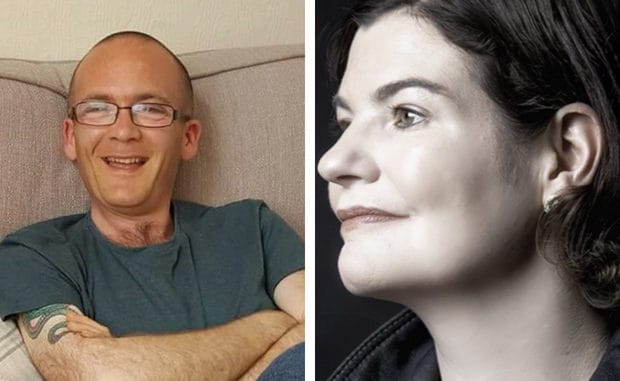
Last week Melissa and Matthew debated opposite sides of the coin on the value of the UK monarchy. Matthew said they should go, Melissa said they were a valued institution. Those who voted in our poll agreed with Melissa with 64% agreeing with her view.
This week the pair debate the legalisation of drugs.
Melissa says

I was heartbroken to hear of the two drug-related deaths at the music festival in Portsmouth. I have a teenage son: he loves a music festival; it could easily have been my boy.
And it could easily have been prevented.
If drugs were regulated, quality controlled, tested, there’d be no “high strength” or “bad batch” drugs. If I buy a 13% Shiraz in Tesco, I can rely on its not being 75%, sending me blind or killing me. Drug users should be afforded the same courtesy.
Has anyone ever not taken drugs because they’re illegal? Really? I don’t take drugs. That’s because I’m in love with the inside of my brain. If heroin were legal, I still wouldn’t partake. Drug users are indifferent to the legality of their actions. Obviously.
It’s always been illegal: there have always been drug users. Despite its draconian drug laws, the UK is the largest consumer of drugs in Europe. Drug decriminalisation would allow us to talk about their use more openly, as well as ensuring that what gets taken is safe; reduce the crime, gangs and anti-social behaviour that currently surrounds drug use, and, perhaps more importantly, increase tax revenue.
Out with crack dens: in with quality control and VAT! Your local drug dealer’s Porsche could be funding the NHS instead, if only we were prepared to be a little more canny and grown up. Every other crutch on which the British public rests to see them through their wretched lives is taxed to hell. Wine, cigarettes, sugar.
It’s estimated the British economy would be £20 billion worse off if there were no smoking, drinking or obesity, even allowing for the resultant cost to the NHS. Smoking has no benefits, stinks, makes you ill and wrinkly, yet still remains legal. What sense does that make?
Drugs aren’t the problem. Reality is the problem: drugs are just a solution. Many of us struggle to deal with reality every day. We try to fix it with booze, tobacco, chocolate, cheese, shopping, social media. I grab at my phone the second my eyes open of a morning to check I’m not alone, that I’ve not been forgotten, that someone, somewhere, is still ‘liking’ my posts, that I still matter. Perhaps you do too. Why should that be any more legal than weed?
Ah, weed. Cannabis has been proven, over and over, to help with chronic pain, seizures, inflammation and nausea. It’s cheap and non-addictive, unlike so many of the prescribed opiates like codeine and tramadol, horribly, rapidly addictive, which are currently causing endless problems among chronic pain sufferers.
In 2011, 55% of drug overdose deaths were related to prescription medications, and 75% of those deaths involved opiate painkillers. But they make money for big pharmaceutical companies, so obviously they’re fine. Heaven forbid a tiny plant grown in someone’s house, tax free, should be allowed to flourish. While cannabis remains illegal, researchers are unable to study it for its potential medicinal value, nor indeed magic mushrooms, or LSD, both of which are thought to be beneficial in treating the scourge of depression.
Admittedly some studies link cannabis use to psychosis. But it’s probably not that simple. Other studies suggest that people with psychological problems are simply more likely to self-medicate with the drug – in other words, the link is correlative, rather than causative.
Legalising drugs would make money, make drugs safer, ease chronic suffering. The deep web has made every exotic drug so readily, easily accessible they are now delivered by Royal Mail. We could try sending our desperately overstretched police force to investigate, diverting resources from real criminals who do real harm; but instead, for once, let’s be sensible. Let’s instead make some money from people quietly enjoying themselves, and decide too to keep them safe.
Matthew says:

It’s easy to be frustrated with drugs policies as they stand. People report they can get drugs with relative ease, and too many have suffered the heartbreak of addiction affecting a loved one or ourselves. The market for drugs is violent and deadly.
But being unhappy with drug abuse is no reason to legalise drugs. In fact, the best evidence we have shows that legalisation would make a bad drug problem much worse – by increasing addiction, normalising use among kids and relegating its sale to profit-hungry corporations or governments with every incentive to increase addiction to advance their bottom line. Legalisation is a very sloppy way to address the current devastation of British drugs policies.
One of the major arguments in favour of legalisation – the apparent reduction of the violent underground market – is unlikely to materialise. As governments put restrictions like age limits on legal drugs, the illicit economy will be happy to step in to fill the gap. At least 22% of the UK tobacco market consists of black market cigarettes.
Yes, mass imprisonment is a bad thing. But rather than legalise – which would increase crime and potentially increase incarceration rates – we should invest more in strategies such as drug treatment, specialised courts, better drug prevention, smart enforcement, and international partnerships that promote alternative uses for land.
By expanding treatment and recovery services, drug use fell almost 15% between 2005 and 2011. But that doesn’t mean there isn’t more we should be doing.
Yes, there is currently a war on drugs, and it’s easy to believe that we – the non-drug-using majority – are losing the war, so we should therefore legalise drugs. But am I missing something? Just because we’re (apparently) losing the war doesn’t automatically mean we should raise the white flag of surrender and give in to the appeasers of drug use.
Let’s speak bluntly; drug use is bad for you. They have the potential to kill you. I’m not talking about the medicinal uses of cannabis, but heroin and cocaine, MDMA and ecstasy. Why in the name of all that is holy would we possibly want to legalise things that are bad for us?
Also, I note with genuine fascination the argument that legalisation will bring all the drug dealers out of hiding and under the banner of legal services. Huh? Will all drug dealers – those scary dealers who like nothing better to break someone’s legs when their debt isn’t repaid at 2000% interest – honestly say, “Oh right, these drugs I’m carrying in my back pocket are now legal. Time to suit up, lads, and get ourselves a corner office.”
No, of course they won’t, and it’s unbelievably naive – if you’ll forgive me for continuing to be blunt – to think that they will. I admire the sentiment, but legalising heroin will not bring in vast amounts of taxation; it will continue destroying and blighting lives.
We need to invest more time, energy, and money into effective strategies for reducing the dependency on drugs, dealing with the issues that get kids hooked in the first place, as well as stopping the countries who produce it from creating and exporting their dangerous products.
We shouldn’t accept an abject surrender to the drug lords and drug dealers in this country. People need help recovering from a drug addiction, and those people that make a living from dealing in drugs need to be punished harshly. Legalisation is criminal; people in thrall need help, and those peddling these pernicious chemicals must be stopped.

